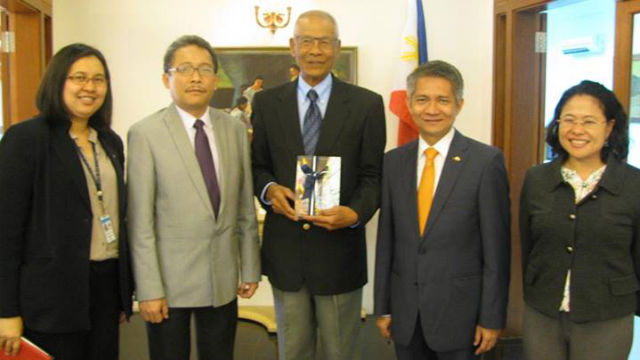SUMMARY
This is AI generated summarization, which may have errors. For context, always refer to the full article.
 I had a discussion among my foreign service batch mates on misunderstandings about our job, even with the numerous articles and blogs on life in the Philippine foreign service.
I had a discussion among my foreign service batch mates on misunderstandings about our job, even with the numerous articles and blogs on life in the Philippine foreign service.
Another batch mate pointed out that, perhaps, those who wrote were in the process of taking the exams, those who just assumed office, or those who have left the service. There is no voice from those currently serving time and seeing things as they unfold. (READ: How to take the FSO exam)
While there are actively-serving colleagues who write about the issues, there are those who should share their experiences but cannot, either because of lack of time, or that they handle such complicated issues too difficult to tackle.
In this regard (and this does not represent in any way the views of the Department of Foreign Affairs or the Philippine Embassy in Malaysia), I write this as a small way of providing another perspective of how life in the foreign service really is like, beyond the so-called glitz and glamour.
Allow me to give a view of what really happens at the department and in our foreign service posts.
We are civil servants
Foreign Service Officers (FSOs) are government employees, subject to the same rules as any civil servant. We quietly do our jobs in the best that we can, within the bounds of our evironment. Overseas, we are also subject to our host country’s laws and regulations.
That is why Filipinos in some countries have to get exit visas before leaving, or why permission is needed to access those in jail. Countries have different ways of doing things, or have different cultures than ours – and we have to adjust to those.

More than just Overseas Filipino Workers welfare and passports
We are not just about providing passports and handling OFW concerns (and no, we don’t give American or Schengen visas). We also help protect Philippine territory, maintain peaceful bilateral and multilateral relations, and promote trade, investments and tourism in coordination with other government agencies.
Currently, I handle the Embassy’s economic, culture and information portfolio, so my workload consists of meetings with businessmen and other investors interested in the Philippines, organizing cultural events, handling information requests, and managing the media.
Diplomatic talk
Something I learned at the Department’s Public Information Services Unit (PISU is the DFA Spokesperson’s office) is that the DFA has both domestic and foreign audiences. This means that when it releases information, it has to be said in a very calculated, couched, diplomatic (and according to some, vague) manner, lest we offend our international partners.
That is why DFA spokespersons usually tend to not immediately take the media bait. A good spokesperson will get more information before saying anything. With the advent of social media, the lines between domestic and foreign audiences get blurred, which makes our jobs easier and harder at the same time.
Open 24/7
Former DFA Secretary Alberto Romulo referred to the department as “the agency that never sleeps.” At any time of the day, a Philippine foreign service post is open.
In 2011, the Arab Spring and natural calamities in Japan and Australia were trying times for everyone at the agency – coordinating efforts on the ground and in Manila; taking calls from worried and sometimes irate family members; and giving updates to the media.
We work from home, on the way to the office, and even at unholy times and ungodly situations.
This is more evident overseas. Here in Malaysia, I find my evenings and weekends occupied by answering media queries, attending to concerns from Manila and/or going to Filipino community events.
Flexibility, creativity and willingness to learn
Being an FSO means handling everything under the sun, thinking on your toes, thinking out of the box, and learning things on-the-fly. You have to be prepared to talk about anything (yes, even Philippine showbiz) and express yourself well.
We write reports, supervise meetings, act as protocol officers and even serve as note takers. For FSOs at post, we sign consular documents, officiate weddings between Filipino nationals, receive guests who visit the Embassy or provide assistance to Filipinos in distress.
We also work on ideas and procedures to make life easier for our countrymen and, in a way, for ourselves. For instance, we employ social media to disseminate information to Filipinos here. We use pakikisama (camaraderie) to cultivate contacts within our circles, and pull out the ubiquitous dried mangoes and capiz shells whenever we promote Philippine trade and tourism.
One must not be picky on assignments and learn things that are beyond and even below one’s level – from taking an on-cam interview to operating a photocopying machine. It is through reading up, learning on the job, and adjusting and/or adapting to differing working styles of bosses and colleagues that you get through the DFA work days.
Bottom line: Love of country
It is important to note that despite the challenges, we do our best to work with and through the existing domestic system and our host countries’ laws to provide “service with a smile.” As a result, we are able to maintain vibrant and smooth relations with other countries as well as promote the interests of Filipinos globally.
We have our strengths and weaknesses, issues and successes, but working in the Philippine foreign service means that we have to represent the country and the Filipino people in the best way possible.
Being an FSO is about love of country and doing our best for our kababayans (countrymen). When the going gets tough, and our to-do list is swamped with briefing papers, meetings, communications, events and what-have-yous, our love of the Philippines and our drive to serve it are our best vitamins to continue our work. – Rappler.com
Johann Andal is a vice-consul at the Philippine Embassy in Malaysia and has been with the DFA since 2009.
iSpeak is a parking space for ideas worth sharing. Send in your contributions to move.ph@rappler.com.
Add a comment
How does this make you feel?
There are no comments yet. Add your comment to start the conversation.